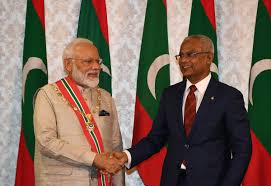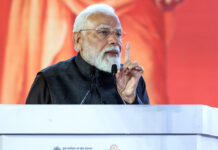NEW DELHI: As tourism-the most important sector for Maldives, contributing the most of the nations gross domestic product-took a huge blow with the spread of the coronavirus pandemic, concerns over debt repayment to ‘ally China are looming large.
The archipelago nation on the Indian Ocean owes about $1.4 billion to China. It is a huge sum for a country which has a GDP of $5.7 billion, this translates to almost one-fourth. What is worrisome is that, as many analysts said, the figure of $1.4 billion may not be a true representation, the actual debt feared to be much higher.
With the pandemic hitting the economy hard, amid the World Bank’s projection of an 8.5 per cent contraction in its economy, the nation is in no position to make the repayment. Besides tourism, the country’s construction activities have also come to a near halt.
“The shock to tourism adversely affects employment and household earnings, as one-third of adult males and a quarter of females are engaged in tourism-related jobs. Lower-income households that depend on fisheries are also affected as exports of raw fish have ceased due to weak demand,” a World Bank report said.
Tourism accounts for about 28 per cent of the country’s GDP and generates over 60 per cent foreign exchange receipts.
In 2018, the Maldives government had indicated that interest rates extended on concessional loans from the dragon nation constitutes only about 1.5 per cent to 2 per cent, “while those on loans made under sovereign guarantee are around 6 per cent to 7 per cent”. The Nikkei Asian Review had quoted Maldivian Finance Minister Ibrahim Ameer as saying, “We are mostly looking into increasing the repayment period.”
The Chinese debt trap
Maldives President Ibrahim Mohamed Solih, soon after getting elected in 2018, said that the country’s close tie-ups with China has brought about a financial crisis into the nation.
“Solih appeared to be in no doubt that the country’s financial crisis was brought about by the previous administration’s overly-close relationship with China. The implication is that China, as it has done in Sri Lanka, has used financial loans to manipulate the Maldives into a position of indebtedness to Beijing,” Futuredirections.org.au said.
The Maldives-India Relationship: From Frying Pan to Fire?
Just after Maldives celebrated its 55th Independence Day on July 26, China issued a notice asking Male to repay $10 million which was backed by sovereign guarantee. This means that failure to repay would amount to a sovereign default that has serious ramifications for the country’s economy. Reports have suggested that the Xi Jinping government in August sought repayment of a larger amount, paid.
In 2017, China gave a $127 million loan to Sun Siyam Resorts Private Ltd but what is interesting is that the Maldivian government had extended sovereign guarantee for the same.
“At $1.4 billion, of which $857 million has been disbursed, most of the foreign debt is owed to China for financing former President Abdulla Yameen’s infrastructure scale-up,” Maldives Independent reported said.
According to Harvard Business Review, China with its debt diplomacy, currently is a major global lender, with outstanding claims now exceeding more than 5 per cent of global GDP. The lending is done both directly by the government and the state-controlled entities.
India and Maldives
Relations between India and Maldives ran into troubled waters under former Maldivian president Abdulla Yameen, who conceded defeat in the 2018 elections.
Thereafter, however, India-Maldives ties have started improving with Prime Minister Narendra Modi attending Solih’s swearing in ceremony. Importantly, Maldives stood by India at the Organization of Islamic Countries (OIC) virtual meet at a time when New Delhi had come under attack in the wake of the abrogation of Article 370 and the passing of Citizenship Amendment Act (CAA).
“Targeting a specific country will be like side-stepping the real issue. In this light, let me state that singling out India, the largest democracy in the world and a multicultural society and home to over 200 million Muslims, alleging Islamophobia would be factually incorrect,” Maldives’ Permanent Representative to the UN Ambassador Thilmeeza Hussain said in the meeting.
Earlier, Solih even thanked India for rescuing Maldivians stuck at Wuhan when the coronavirus pandemic had hit the region.







